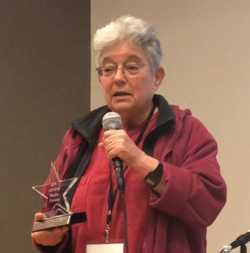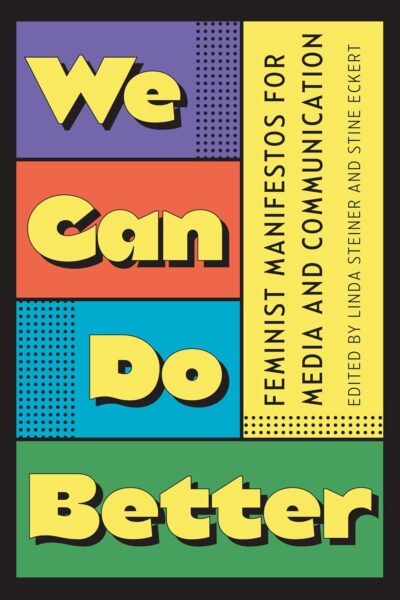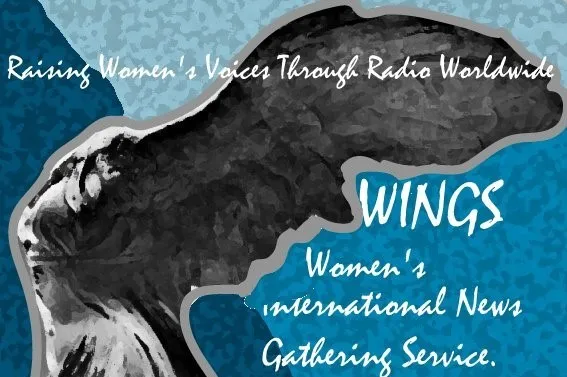
A Note from Frieda Lindfield Werden, WINGS.org — The full version of the article I wrote, which appears as the lead piece in a new anthology called We Can Do Better: Feminist Manifestos for Media and Communication, was edited by Linda Steiner and Stine Eckert (Rutgers University Press, 2025). Scroll down to read an excerpt.
About the book, published April 2025: Feminist Manifestos for Media and Communication brings together evidence-based manifestos for media and communication that take a feminist perspective and add up to a provocative vision of feminist media practices and of feminist communication. The book discusses critical problems and complaints in ways that identify and make the case for actionable, concrete solutions to media problems and deficiencies; it shows how feminist thinking can be usefully and effectively applied to a wide range of journalism, media, and communication practices.
 The manifestos are not “only” about women but rather offer specific, feasible blueprints for restructuring media in ways that make them fairer and more equitable along many vectors of identity, so that media can better serve democracy. These manifestos give concrete solutions to specific problems that can and should be implemented by journalists, media practitioners, students, faculty, and scholars. The manifestos are organized around three sets of demands: for better media practices, for more participatory online spaces, and for more precise and appropriate language. Click here to learn more.
The manifestos are not “only” about women but rather offer specific, feasible blueprints for restructuring media in ways that make them fairer and more equitable along many vectors of identity, so that media can better serve democracy. These manifestos give concrete solutions to specific problems that can and should be implemented by journalists, media practitioners, students, faculty, and scholars. The manifestos are organized around three sets of demands: for better media practices, for more participatory online spaces, and for more precise and appropriate language. Click here to learn more.
From Frieda’s article:
CHALLENGES FOR FEMINIST MEDIA TODAY
Women have more access to the means to make media today than anyone could have imagined in Donna Allen’s day. Our challenge now is to use our platforms in an expansive manner; to amplify a wide range of voices, experiences and opinions; find our appropriate audiences; follow each others’ work; help each other expand the pool of women practitioners; and evade as much as possible being captured or censored by forces seeking power and profits. We don’t have to stay in genre silos, we can follow connections where they lead us.
An additional challenge is staying alive and helping each other remain alive and out of prison. Journalists, especially women journalists, are at grave risk in many parts of the world. WINGS has joined the International Association of Women in Radio and Television – a group that was formed in 1949 to create friendships among women from countries that were enemies of each other. Among the group’s current projects is support for women journalists who are being jailed or exiled by governments that don’t like the truth and want to repress women.
In a world of contested facts, it is more valuable than ever to seek out and amplify women’s first-person stories about their activism and life experiences and those of women around them. We have a duty to acknowledge contrasting information and experience and not just bolster pre-existing biases.
Genevieve Vaughan, a feminist and peace organizer and theorist with whom WINGS has been associated for many years, has written and spoken widely about what she calls the maternal gift economy. Exemplified by the unilateral giving that every child receives in order to survive, the gift economy is fundamental everywhere in nature, including human nature, she says, even when denied and exploited by capitalism. In this paradigm, feminist media that lets women speak for themselves falls into the category of the gift of truth (in a world of lies).
LOOK FOR A BRIGHT SIDE
A great deal of what happens to women – and the rest of the world – can be sad and depressing. When our radio show WINGS first started in 1986 we had an offer from a woman we met to take the show to a radio station in Hawaii and see if they would carry it. But after she listened, she said “I can’t take them this. It’s too depressing.” That’s when we made it a matter of principle never to let a show or a story be only about “ain’t it awful.” News that makes people angry and sad can be disempowering and play into the schemes of power-mongers. Even when we report on what’s awful it is through the words and deeds of women who are standing up in resistance to the awful and working to make things better. That element of faith is essential to maintain a feminist movement.
NETWORK AND COLLABORATE
Feminist media is not made in or for a vacuum. It grows out of, and gives back to, the feminist movement and the feminist media movement (which if you follow Donna Allen’s thinking, are pretty much one and the same). For most of us involved in feminist media it is not a lucrative career, often voluntary. We are motivated by curiosity and a sense of craft, a love of truth, stories, voices, images and feelings, and ambition to see the patriarchal paradigm crumble.
This is not the kind of task you want to take on alone.
Many women’s media groups are short-lived, for internal or external reasons. There can be personality clashes, divergent goals, power grabs, loss of a space or funds. But some continue in one form or another in spite of all. A case in point is Women Make Movies, which according to co-founder Ariel Dougherty was incorporated in 1972 by two women filmmakers who taught media and production to youth and community women. In 1975, they co-authored a feminist media manifesto with other groups. When they tried to get women’s films distributed, Ariel says, they were told “Women are not an audience.” WMM then set up its own distribution system for feminist films, and now also brokers placement of women’s films in mainstream media. They continue to be a supportive institution for training and development.
Community media has been and continues to be a good structure within which women can practice our craft. Both community radio and in some places community television provide the technical infrastructure, training and ongoing information streams that women and youth can be part of at no cost. The World Association of Community Radio Broadcasters (French initials AMARC) was the first group WINGS joined in 1986. A few years later, WINGS co-founder Katherine Davenport helped create the Women’s International Network within the organization (AMARC-WIN) and to make rules that women have places in organizational leadership.
The Women’s Institute for Freedom of the Press that was founded by Donna Allen is still in Washington DC. It’s now run by her daughter, Martha Leslie Allen, author of History of Women’s Media: The Development of Communication Networks Among Women, 1963-1983. WIFP takes in groups of young women interns from a range of countries and cultural backgrounds. They get trained and collaborate and build good feminist media muscles.
Among the highly effective women who interned there, I’ll close by mentioning Birgitte Jallov from Denmark. From a start in local community media, she has built an organization called EmpowerHouse, which helps communities around the world set up community radio stations. In an interview with WINGS, she said she always makes sure there is plenty of room for women. In a survey of effectiveness of community radio stations she had seeded in Africa, she found one poignant statement was almost universal: “We are being beaten up less,” the women said. Their presence in the radio station, their voices on the air, had made them visible in the community, increased their solidarity, and raised their stature.
It is difficult, but not impossible for women to be heard.
 About Frieda Lindfield Werden: Born 1947, Frieda is the co-founder and producer of the weekly radio series WINGS: Women’s International News Gathering Service, which debuted in 1986 and has been in weekly syndication for more than twenty-seven years. Produced by and about women, WINGS broadcasts on non-commercial radio stations worldwide.
About Frieda Lindfield Werden: Born 1947, Frieda is the co-founder and producer of the weekly radio series WINGS: Women’s International News Gathering Service, which debuted in 1986 and has been in weekly syndication for more than twenty-seven years. Produced by and about women, WINGS broadcasts on non-commercial radio stations worldwide.
Born in 1947 as Linda Catherine Samfield in Austin, Texas, in 1972, she formally changed her name to Frieda Lindfield Werden. She lived in several other US cities before emigrating to Canada in 2002. She began producing radio with the Longhorn Radio Network in 1973. Her early radio series included Women Today, a show about feminist movements in Texas. In 1975 Werden co-produced a multipart radio series about homosexuality called What’s Normal?
In 1983, she worked for National Public Radio producing docudramas about various women writers, and, working with Judie Pasternak, formed a women’s news caucus at the National Federation of Community Radio Broadcasters conference. In 1985, she became operations manager of Western Public Radio in San Francisco. There she co-founded WINGS: Women’s International News Gathering Service (1986-nowadays) with Katherine Davenport and Augusta Del Zotto, heavily inspired by a newsletter called Media Report to Women[3]which was produced by The Women’s Institute for Freedom of the Press. The inaugural WINGSnewscast was released in May 1986 with the financial assistance of NPR’s Satellite Program Development Fund. Initially based out of their San Francisco home, Werden moved back to Austin, Texas after Davenport’s passing from Leukemia in 1992.
In 1993, Werden became an associate of the Women’s Institute for Freedom of the Press (WIFP). WIFP is an American nonprofit publishing organization. The organization works to increase communication between women and connect the public with forms of women-based media. In the 1990s, she worked with a team of women in Austin, Texas, to produce a cable access television show called Women’s News Hour. Until 2002, she worked for Genevieve Vaughan’s Foundation for a Compassionate Society in Austin, Texas, and helped to establish and staff Women’s Access to Electronic Resources (WATER).[1]In 1998, in Milan, Werden became North America Representative to the Women’s International Network of AMARC (the World Association of Community Radio Broadcasters). As such, she represented AMARC on the Task Force on Gender Issues of the International Telecommunication Union (ITU) in Geneva.
In 2005, Werden was elected president of the International Association of Women in Radio and Television. From 2002-2007, she served as Vice President for North America on the international Board of Directors of (AMARC). In June 2006, she received the inaugural “Lifetime Achievement Award” at the 25th Annual National Community Radio Conference, a project of the Canadian National Campus and Community Radio Association (NCRA). In 2015, she received a Lifetime Achievement Award from the International Association of Women in Radio and TV. On Oct. 6, 2019, she received the 2019 Art FM Radio Pioneer Award at the end of the Grassroots Radio Conference, from ARTxFM / WXOX in Louisville, Kentucky.
